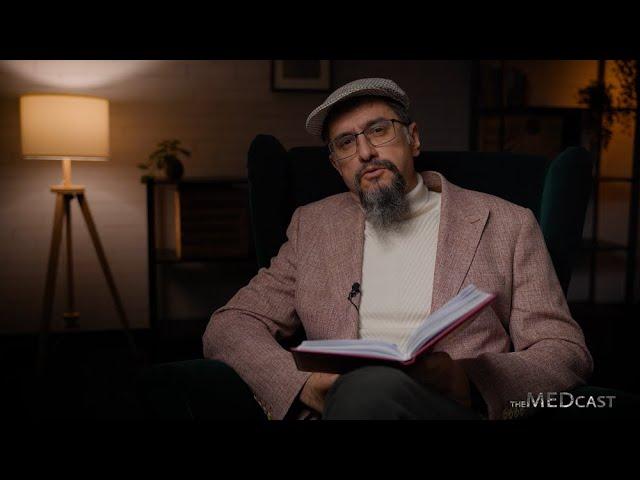
"Aging of germ cells", ep. 5
In episode 5 of the MEDcast, Dr. Stamenov talks about the aging of germ cells.
Dr Georgi Stamenov – Founder of Nadezhda Hospital and Head of Nadezhda IVF Centre
Dr Georgi Stamenov is a leading Bulgarian specialist in reproductive medicine and the founder of Nadezhda Hospital. He has dedicated his whole life to helping couples on the fertility journey.
While still at Medical University, he started working as an orderly at the largest maternity hospital in the country, Maichin dom. In his third year as a medical studen he was already tempted by assisted reproduction, and in 2000 he finished his specialty training in Obstetrics and Gynaecology. Three years later he started Nadezhda Centre for Reproductive Health, which in 2013 evolved into Nadezhda Hospital – the largest privately owned healthcare establishment focused on women’s health in the country.
In 2013 he defended his doctoral thesis in Obstretrics and Gynaecology on the topic of Markers for evaluation of embryonic parameters in non-stimulated cycle. Development of a predictive model for assessment of the implantation potential of human embryos. The research work throws more light on one of the hottest debates in assisted reproduction – the problem of egg quality and evaluating their implantation potential by measuring biological markers in the follicular fluid. The mathematical model developed predicts the chances for successful pregnancy with high confidence, for both positive (79.11%) and negative (93.10%) results and preserved its prognostic power in clinical validation too. The method offers thus a tool for a more precise and adequate evaluation and selection of embryos with high implantation potential. Dr Stamenov has authored scientific research publications in national and international peer-reviewed journals. He has been an invited speaker and presented his research before numerous international scientific meetings, symposia and congresses. Today, Nadezhda Hospital is a thriving centre for postgraduate training of medical specialists and residents. The hospital organises and hosts educational events for the medical community, including science talks and live surgery sessions, where Dr Stamenov has been joined by some of the world’s top names in gynecology.
In 2017, Dr Stamenov brought together for a noble cause Bulgaria’s leading experts in reproductive medicine, maternal-fetal medicine, medical oncology, radiotherapy, immunology and genetics, as well as representatives of the Executive agency on Transplantation and the State Fund for assisted reproduction with the Ministry of Health, who after in-depth debates hosted at Nadezhda hospital, signed a historical document – the county-first Consensus Statement on fertility preservation for cancer patients and patients with autoimmune and rheumatoid disease. The Medical Consensus is focused on the recommendation that cancer patients and patients with autoimmune and rheumatoid diseases should be offered prompt consultation on fertility preservation options before commencing their therapy.
Dr Stamenov is a member of professional organisations like the European Society for Human Reproduction and Embryology (ESHRE), the American Society of Reproductive Medicine (ASRM), the Bulgarian Medical Union, the Bulgarian Scientific Society of Obstetrics and Gynaecology, and the Bulgarian Association of Sterility and Reproductive Health.
Dr Stamenov has developed and established Nadezhda Hospital as a leader in Assisted reproduction in Bulgaria and Southeastern Europe. The hospital also offers world quality standard of care during pregnancy with its Maternal-Foetal Medicine and Intrauterine Surgery and Pregnancy monitoring units. The maternity ward is one of a kind in the country and has welcomed more than 14 thousand newborns. The Neonatology department holds the highest (third) level of competency. Leading experts form the team of the Gynaecology department. The Medical oncology clinic sees patients from the whole country. The hospital also features top-notch medical imaging, surgical suites and intensive care unit, as well as eight modern state-of-the-art labs (Clinical lab, immunology, genetics, histopathology, microbiology, embryology and andrology labs).
Dr Georgi Stamenov – Founder of Nadezhda Hospital and Head of Nadezhda IVF Centre
Dr Georgi Stamenov is a leading Bulgarian specialist in reproductive medicine and the founder of Nadezhda Hospital. He has dedicated his whole life to helping couples on the fertility journey.
While still at Medical University, he started working as an orderly at the largest maternity hospital in the country, Maichin dom. In his third year as a medical studen he was already tempted by assisted reproduction, and in 2000 he finished his specialty training in Obstetrics and Gynaecology. Three years later he started Nadezhda Centre for Reproductive Health, which in 2013 evolved into Nadezhda Hospital – the largest privately owned healthcare establishment focused on women’s health in the country.
In 2013 he defended his doctoral thesis in Obstretrics and Gynaecology on the topic of Markers for evaluation of embryonic parameters in non-stimulated cycle. Development of a predictive model for assessment of the implantation potential of human embryos. The research work throws more light on one of the hottest debates in assisted reproduction – the problem of egg quality and evaluating their implantation potential by measuring biological markers in the follicular fluid. The mathematical model developed predicts the chances for successful pregnancy with high confidence, for both positive (79.11%) and negative (93.10%) results and preserved its prognostic power in clinical validation too. The method offers thus a tool for a more precise and adequate evaluation and selection of embryos with high implantation potential. Dr Stamenov has authored scientific research publications in national and international peer-reviewed journals. He has been an invited speaker and presented his research before numerous international scientific meetings, symposia and congresses. Today, Nadezhda Hospital is a thriving centre for postgraduate training of medical specialists and residents. The hospital organises and hosts educational events for the medical community, including science talks and live surgery sessions, where Dr Stamenov has been joined by some of the world’s top names in gynecology.
In 2017, Dr Stamenov brought together for a noble cause Bulgaria’s leading experts in reproductive medicine, maternal-fetal medicine, medical oncology, radiotherapy, immunology and genetics, as well as representatives of the Executive agency on Transplantation and the State Fund for assisted reproduction with the Ministry of Health, who after in-depth debates hosted at Nadezhda hospital, signed a historical document – the county-first Consensus Statement on fertility preservation for cancer patients and patients with autoimmune and rheumatoid disease. The Medical Consensus is focused on the recommendation that cancer patients and patients with autoimmune and rheumatoid diseases should be offered prompt consultation on fertility preservation options before commencing their therapy.
Dr Stamenov is a member of professional organisations like the European Society for Human Reproduction and Embryology (ESHRE), the American Society of Reproductive Medicine (ASRM), the Bulgarian Medical Union, the Bulgarian Scientific Society of Obstetrics and Gynaecology, and the Bulgarian Association of Sterility and Reproductive Health.
Dr Stamenov has developed and established Nadezhda Hospital as a leader in Assisted reproduction in Bulgaria and Southeastern Europe. The hospital also offers world quality standard of care during pregnancy with its Maternal-Foetal Medicine and Intrauterine Surgery and Pregnancy monitoring units. The maternity ward is one of a kind in the country and has welcomed more than 14 thousand newborns. The Neonatology department holds the highest (third) level of competency. Leading experts form the team of the Gynaecology department. The Medical oncology clinic sees patients from the whole country. The hospital also features top-notch medical imaging, surgical suites and intensive care unit, as well as eight modern state-of-the-art labs (Clinical lab, immunology, genetics, histopathology, microbiology, embryology and andrology labs).
Комментарии:
"Aging of germ cells", ep. 5
MBAL ZA ZHENSKO ZDRAVE NADEZHDA OOD
A Liberal Arts Approach to Understanding and Addressing Global Problems
EmoryUniversity CFDE
ЖЕНЯ ИВАНОВА в Instagram Инфопродюсеры
Андрей Сеничев
Elias having some hiccups
broerden




















